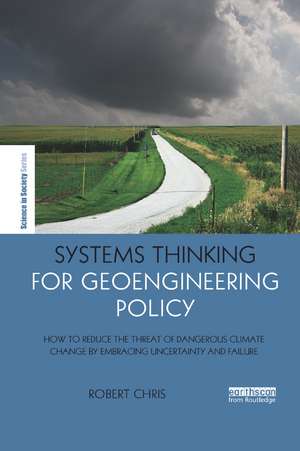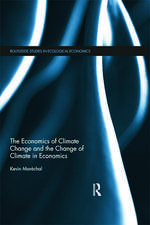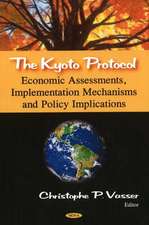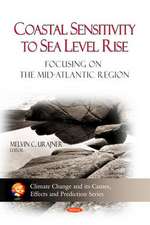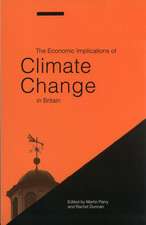Systems Thinking for Geoengineering Policy: How to reduce the threat of dangerous climate change by embracing uncertainty and failure: The Earthscan Science in Society Series
Autor Robert Chrisen Limba Engleză Paperback – 21 mar 2019
Systems Thinking for Geoengineering Policy is the first book to theorise geoengineering in terms of complex adaptive systems theory and to argue for the theoretical imperative of adaptive management as the default methodology for an effective low risk means of confronting the inescapable uncertainty and surprise that characterise potential climate futures. The book illustrates how a shift from the conventional Enlightenment paradigm of linear reductionist thinking, in favour of systems thinking, would promote policies that are robust against the widest range of plausible futures rather than optimal only for the most likely, and also unlock the policy paralysis caused by making long term predictions of policy outcomes a prior condition for policy formulation. It also offers some systems driven reflections on a global governance network for geoengineering.
This book is a valuable resource for all those with an interest in climate change policy, geoengineering, and CAS theory, including academics, under- and postgraduate students and policymakers.
| Toate formatele și edițiile | Preț | Express |
|---|---|---|
| Paperback (1) | 469.34 lei 6-8 săpt. | |
| Taylor & Francis – 21 mar 2019 | 469.34 lei 6-8 săpt. | |
| Hardback (1) | 1054.71 lei 6-8 săpt. | |
| Taylor & Francis – 24 noi 2015 | 1054.71 lei 6-8 săpt. |
Din seria The Earthscan Science in Society Series
-
 Preț: 340.37 lei
Preț: 340.37 lei -
 Preț: 340.37 lei
Preț: 340.37 lei -
 Preț: 198.19 lei
Preț: 198.19 lei -
 Preț: 488.29 lei
Preț: 488.29 lei -
 Preț: 382.75 lei
Preț: 382.75 lei -
 Preț: 456.06 lei
Preț: 456.06 lei -
 Preț: 424.58 lei
Preț: 424.58 lei -
 Preț: 418.67 lei
Preț: 418.67 lei - 18%
 Preț: 1017.91 lei
Preț: 1017.91 lei - 21%
 Preț: 378.39 lei
Preț: 378.39 lei -
 Preț: 412.37 lei
Preț: 412.37 lei -
 Preț: 449.41 lei
Preț: 449.41 lei -
 Preț: 469.34 lei
Preț: 469.34 lei - 12%
 Preț: 299.52 lei
Preț: 299.52 lei - 13%
 Preț: 333.12 lei
Preț: 333.12 lei -
 Preț: 416.22 lei
Preț: 416.22 lei -
 Preț: 413.33 lei
Preț: 413.33 lei -
 Preț: 116.59 lei
Preț: 116.59 lei -
 Preț: 411.42 lei
Preț: 411.42 lei - 22%
 Preț: 332.02 lei
Preț: 332.02 lei - 15%
 Preț: 463.46 lei
Preț: 463.46 lei -
 Preț: 444.62 lei
Preț: 444.62 lei - 18%
 Preț: 1001.87 lei
Preț: 1001.87 lei - 18%
 Preț: 1114.64 lei
Preț: 1114.64 lei -
 Preț: 392.24 lei
Preț: 392.24 lei -
 Preț: 390.54 lei
Preț: 390.54 lei -
 Preț: 357.43 lei
Preț: 357.43 lei - 18%
 Preț: 1054.71 lei
Preț: 1054.71 lei -
 Preț: 444.62 lei
Preț: 444.62 lei - 18%
 Preț: 1278.88 lei
Preț: 1278.88 lei - 26%
 Preț: 764.20 lei
Preț: 764.20 lei
Preț: 469.34 lei
Nou
Puncte Express: 704
Preț estimativ în valută:
89.81€ • 93.77$ • 74.33£
89.81€ • 93.77$ • 74.33£
Carte tipărită la comandă
Livrare economică 04-18 aprilie
Preluare comenzi: 021 569.72.76
Specificații
ISBN-13: 9780367271237
ISBN-10: 0367271230
Pagini: 212
Ilustrații: 20
Dimensiuni: 156 x 234 x 12 mm
Greutate: 0.45 kg
Ediția:1
Editura: Taylor & Francis
Colecția Routledge
Seria The Earthscan Science in Society Series
Locul publicării:Oxford, United Kingdom
ISBN-10: 0367271230
Pagini: 212
Ilustrații: 20
Dimensiuni: 156 x 234 x 12 mm
Greutate: 0.45 kg
Ediția:1
Editura: Taylor & Francis
Colecția Routledge
Seria The Earthscan Science in Society Series
Locul publicării:Oxford, United Kingdom
Public țintă
Postgraduate and UndergraduateCuprins
1. Contextualising Geoengineering 2. Geoengineering - the technologies and their ‘times’ 3. The Limits of Reductionism 4. Systems thinking 5. Geoengineering and uncertainty 6. Geoengineering: complexity in policymaking 7. Downgrading geoengineering from solution to contribution 8. Geoengineering governance network (GGN) 9. Drawing the threads together
Recenzii
"Robert Chris convincingly describes the limitations of reductionist thinking when facing the complex challenge of developing appropriate policy for geoengineering research. By charting a way for geoengineering research policy that appreciates the features of complex adaptive systems, Chris moves beyond critique and opens our imagination to alternative courses of action." – Stefan Schäfer, Institute for Advanced Sustainability Studies (IASS), Potsdam
"This book brings a welcome dose of fresh and constructive thinking to the debate about managing geoengineering technologies with a welcome focus on governing early innovation to manage risk without stifling creativity." – David Keith, Gordon McKay Professor of Applied Physics and Professor of Public Policy, Harvard University
"Radical measures to combat climate change are almost certainly necessary. This book is timely. It identifies the need for empirical research if policy decisions are to be based on knowledge and experience rather than ignorance and conjecture. The proposed "bottom-up" research governance regime would work with the grain of long-term uncertainty and unpredictability, thereby greatly reducing climate risks for future generations." – Hugh Hunt, Department of Engineering and Fellow of Trinity College Cambridge
"In this bold critique of the 'predict-and-control' paradigm of policy-making the world has hitherto been relying on to deal with climate change, Robert Chris breaks new ground by deploying complex adaptive systems theory to the excruciating dilemmas of geoengineering. The implications for climate policy - and policy making in general - are potentially vast." – Olaf Corry, Associate Professor, Department of Political Science, University of Copenhagen
"In Systems Thinking for Geoengineering Policy, Robert Chris proposes a pragmatic approach for researching geoengineering as part of a comprehensive strategy for dealing with climate change that contrasts with the present unproductive approach of delaying any consideration indefinitely while all uncertainties are reduced and a top-down international governance system is established." – Mike MacCracken, Chief Scientist for Climate Change Programs with the Climate Institute in Washington DC
"Robert Chris convincingly describes the limitations of reductionist thinking when facing the complex challenge of developing appropriate policy for geoengineering research. By charting a way for geoengineering research policy that appreciates the features of complex adaptive systems, Chris moves beyond critique and opens our imagination to alternative courses of action." – Stefan Schäfer, Institute for Advanced Sustainability Studies (IASS), Potsdam
"This book brings a welcome dose of fresh and constructive thinking to the debate on taming geoengineering technologies." – David Keith, Gordon McKay Professor of Applied Physics and Professor of Public Policy, Harvard University
"Radical measures to combat climate change are almost certainly necessary. This book is timely. It identifies the need for empirical research if policy decisions are to be based on knowledge and experience rather than ignorance and conjecture. The proposed "bottom-up" research governance regime would work with the grain of long-term uncertainty and unpredictability, thereby greatly reducing climate risks for future generations." – Hugh Hunt, Department of Engineering and Fellow of Trinity College Cambridge
"In this bold critique of the 'predict-and-control' paradigm of policy-making the world has hitherto been relying on to deal with climate change, Robert Chris breaks new ground by deploying complex adaptive systems theory to the excruciating dilemmas of geoengineering. The implications for climate policy - and policy making in general - are potentially vast." – Olaf Corry, Associate Professor, Department of Political Science, University of Copenhagen
"This book brings a welcome dose of fresh and constructive thinking to the debate about managing geoengineering technologies with a welcome focus on governing early innovation to manage risk without stifling creativity." – David Keith, Gordon McKay Professor of Applied Physics and Professor of Public Policy, Harvard University
"Radical measures to combat climate change are almost certainly necessary. This book is timely. It identifies the need for empirical research if policy decisions are to be based on knowledge and experience rather than ignorance and conjecture. The proposed "bottom-up" research governance regime would work with the grain of long-term uncertainty and unpredictability, thereby greatly reducing climate risks for future generations." – Hugh Hunt, Department of Engineering and Fellow of Trinity College Cambridge
"In this bold critique of the 'predict-and-control' paradigm of policy-making the world has hitherto been relying on to deal with climate change, Robert Chris breaks new ground by deploying complex adaptive systems theory to the excruciating dilemmas of geoengineering. The implications for climate policy - and policy making in general - are potentially vast." – Olaf Corry, Associate Professor, Department of Political Science, University of Copenhagen
"In Systems Thinking for Geoengineering Policy, Robert Chris proposes a pragmatic approach for researching geoengineering as part of a comprehensive strategy for dealing with climate change that contrasts with the present unproductive approach of delaying any consideration indefinitely while all uncertainties are reduced and a top-down international governance system is established." – Mike MacCracken, Chief Scientist for Climate Change Programs with the Climate Institute in Washington DC
"Robert Chris convincingly describes the limitations of reductionist thinking when facing the complex challenge of developing appropriate policy for geoengineering research. By charting a way for geoengineering research policy that appreciates the features of complex adaptive systems, Chris moves beyond critique and opens our imagination to alternative courses of action." – Stefan Schäfer, Institute for Advanced Sustainability Studies (IASS), Potsdam
"This book brings a welcome dose of fresh and constructive thinking to the debate on taming geoengineering technologies." – David Keith, Gordon McKay Professor of Applied Physics and Professor of Public Policy, Harvard University
"Radical measures to combat climate change are almost certainly necessary. This book is timely. It identifies the need for empirical research if policy decisions are to be based on knowledge and experience rather than ignorance and conjecture. The proposed "bottom-up" research governance regime would work with the grain of long-term uncertainty and unpredictability, thereby greatly reducing climate risks for future generations." – Hugh Hunt, Department of Engineering and Fellow of Trinity College Cambridge
"In this bold critique of the 'predict-and-control' paradigm of policy-making the world has hitherto been relying on to deal with climate change, Robert Chris breaks new ground by deploying complex adaptive systems theory to the excruciating dilemmas of geoengineering. The implications for climate policy - and policy making in general - are potentially vast." – Olaf Corry, Associate Professor, Department of Political Science, University of Copenhagen
Descriere
This is the first book to theorise geoengineering in terms of complex adaptive systems theory and to argue for the theoretical imperative of adaptive management as the default methodology for an effective low risk means of confronting the inescapable uncertainty and surprise that characterise potential climate futures.
